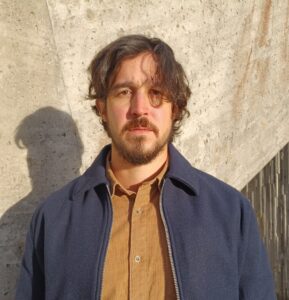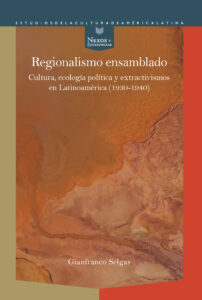ASLE’s Scholar of the Month for May 2025 is Gianfranco Selgas. 
Gianfranco Selgas is a British Academy Postdoctoral Fellow at University College London (UCL). His research focuses on the culture, media, and history of nature extraction and energy across Latin America and the Caribbean. His most recent publications include the book Regionalismo ensamblado: Cultura, ecología política y extractivismos en Latinoamérica (1930-1940) (Iberoamericana Vervuert, 2025), guest-editor of the special issue Energy Matters: Latin America and the Cultural Critique of Energy (Environmental Humanities, vol. 17, 2025), and the chapter “Mining” in Power Shift: Keywords for a New Politics of Energy, edited by Imre Szeman and Jennifer Wenzel (West Virginia University Press, 2025). His research has been awarded the “Best Article on Venezuela Award (Humanities)” by the Latin American Studies Association (LASA) in 2021, the “Post-Doctoral Research Award” by the Society for Latin American Studies (SLAS) in 2023, and recognition in the 3rd edition of the “Professor Andrzej Dembicz Award for the Best Doctoral Thesis on Latin America and the Caribbean” granted by the European Council for Social Research in Latin America (CEISAL) in 2025. He is an affiliated researcher at the Centre for Energy Ethics (University of St Andrews) and a guest affiliated researcher at the Department of Sustainable Development, Environmental Sciences and Engineering (SEED) at KTH Royal Institute of Technology (Sweden).
How did you become interested in studying ecocriticism and/or the environmental humanities?
 My interest in the study of the environmental humanities is the result of a slow and gradual process, one that owes much to my specific political and geographical context growing up. I was born and raised in Venezuela, a country whose economy has, since the 20th century, been predominantly centered on oil extraction and export, and one that has historically been marked by deep socioeconomic inequalities. I grew up in a blue-collar family descended from socialist exiles, a background that, along with my formative years in Venezuela’s public university system in Caracas, played a key role in shaping my political and ideological stance. Growing up in this context made it impossible to later ignore the material and political weight of a dominant socio-economic system that is historically contingent and deeply implicated in the current climate crisis.
My interest in the study of the environmental humanities is the result of a slow and gradual process, one that owes much to my specific political and geographical context growing up. I was born and raised in Venezuela, a country whose economy has, since the 20th century, been predominantly centered on oil extraction and export, and one that has historically been marked by deep socioeconomic inequalities. I grew up in a blue-collar family descended from socialist exiles, a background that, along with my formative years in Venezuela’s public university system in Caracas, played a key role in shaping my political and ideological stance. Growing up in this context made it impossible to later ignore the material and political weight of a dominant socio-economic system that is historically contingent and deeply implicated in the current climate crisis.
In my doctoral studies I explicitly began to engage with ecocriticism and the environmental humanities as a way to answer questions rooted in the historical connections between culture, society, and the environment. My PhD dissertation, published earlier this year as Regionalismo ensamblado (Iberoamericana Vervuert, 2025), resulted in a contribution to the cultural dimension of political ecology by exploring how early 20th-century Latin American discourses performed a historical role by grappling with questions of nature commodification, national development, and extractivism. Combining Latin American political ecology and Marxist ecological critique, my research analyzed newspaper articles, chronicles, historical-geographical essays, scientific studies, novels, and political pamphlets produced in Costa Rica, Colombia, and Venezuela as early political and cultural responses to the global financial crisis of 1930–1940 and to the challenges it posed in terms of the metabolic rift between society, capitalism, and the environment.
Who is your favorite environmental artist, writer, or filmmaker? Or what is your favorite environmental text? Why?
I have a hard time singling out just one as there are many socio-environmental cultural works that I personally consider relevant. However, in the spirit of the question—and in keeping with the arguments of my latest book—I would highlight the work of Costa Rican communist militant Carmen Lyra. In particular, her chronicle Bananas and Men, her political pamphlet Golden Bean: The Coffee Bean and the Laborer, and the numerous opinion pieces she published in Trabajo, the official newspaper of the Costa Rican Communist Party (unfortunately not yet translated into English). These texts, published between 1930-1940, offer a raw, powerful, and largely overlooked perspective on the hidden abodes of labor, racial, sexual, and environmental exploitation in the banana and coffee plantations of Costa Rica’s Atlantic coast. These works are worth revisiting today because they show how environmental dimensions often emerge not as explicit concerns, but through the identification of conflicts, demands, and movements grounded in material and social conditions.
Lyra’s writings shed light on early political responses to the productivist models of capitalist modernity as experienced in Latin America. They also help us conceptualize culture as an ecology of forms and discourses operating within the broader capitalist world-ecology. Reading these discursive variations collectively allows us to trace a sociocultural critique and a historical archive of the entanglements between politics, environment, and society. As the late Héctor Alimonda would put it, this is not about applying anachronistic frameworks or rewriting the past as environmental history. Rather, it is about recognizing that many historical texts—though not always explicitly ecocritical—contain latent dimensions that illuminate the political foundations of what would later become environmental thought, helping us to historicize, critically understand, and transform our current socio-environmental condition.
What are you currently working on?
I am focused on two main projects that trace the historical and political dimensions of extractivism and energy in Venezuela and the Global South. First, I am researching and writing my second book project, which examines the political, intellectual, and environmental history of Venezuela’s regional extractive zones, specifically between 1890-1980—a period during which the country underwent a drastic transformation from an agrarian society to one of the world’s leading oil exporters. I argue that these regional environments were highly valued by the state and foreign capital for serving domestic and international economic interests centered on material and energy consumption. At the same time, they gave rise to a political ecology that both challenged and intertwined with the logic of a fossil-fueled future in Venezuela. Through different case studies, my research explores how radical political, technical, and intellectual discourses emerging from these regions played a historical role in shaping extractive modernity, offering a critical approach to rethink the blind spots of petromodernity at both local and global scales.
Second, together with my colleague Henrik Ernstson (KTH Royal Institute of Technology), I am co-editing the special issue Archives of the Planetary Mine: Excavating Political Ecologies of Nature Extraction and Energy Consumption in the Global South. From the perspective of political ecology and the environmental humanities, the issue explores the Global South as both a global provider and consumer of nature and energy commodities—and as a site of lived experience, resistance, and alternative world-making in relation to, and beyond, capitalist extraction. The notion of the archive is reimagined as a register—expressed through diverse practices and sociocultural formats—of the events that constitute current and historical socio-environmental crises. The contributions examine topics such as the entanglement of extractive frontiers with data, clouds, and artificial intelligence; the use of fire, land clearing, and deforestation as extractivist methods in Bolivia; the consolidation of dispossession policies and illicit economies in Venezuela’s Orinoco Mining Arc; and how contestation and radical politics are shaping emancipatory subjects of the planetary mine. This includes art-activist practices that denounce and deconstruct the extractive logic embedded in Argentina’s cultural industries, as well as the role of cultural production in shaping new cartographies of refusal aimed at confronting colonial and toxic forms of extraction in Brazil and Palestine.
What is something you are reading right now (environmental humanities-related or otherwise) that inspires you, either personally or professionally?
At the moment, I am reading Crude Capitalism: Oil, Corporate Power, and the Making of the World Market (Verso, 2024) by Adam Hanieh. The book presents a historical account of how oil has shaped global capitalism from the late 19th century to the present climate crisis, revealing oil’s deep entanglement with empire, finance, militarism, and consumer culture, while mapping its global geographies and corporate structures. I found Hanieh’s historical analysis essential for understanding the circuits of global energy and capital flow—many of which are often overlooked or only marginally discussed—such as the internal dynamics of OPEC countries, the key role played by African upstream reserves, or the emergence of new petrochemical circuits linking the Middle East, China, and East Asia. I am also preparing a review for the Journal of Energy History of the book Energy’s History: Toward a Global Canon (Stanford UP, 2025), edited by Daniela Russ and Thomas Turnbull. This is a key volume that helps map persuasive visions of energy-driven development beyond the Western capitalist model and provides an expansive and critical account of how energy histories have shaped the past and continue to impact the present.
Broadly speaking, both books contribute to deepening and expanding the field of global energy studies. While Hanieh foregrounds the systemic and structural role of oil in shaping global capitalism, Russ and Turnbull open the door to a global history that foregrounds the multiplicity of energy experiences across different regions and contexts. What I find particularly inspiring about these works is that they demonstrate—each from a different critical and historical angle—that while energy and its derivatives are often understood as a global network underpinning capitalism, technological progress, and modern subjectivities, the lived experience of that network differs significantly depending on where energy is produced and consumed, and on the extent to which its infrastructures and products operate as a common good serving the broader population.
Is there a scholar in the field who inspires you? Why?
Many colleagues have inspired and continue to inspire my work. The list is long and my answer cannot fully do justice to everyone involved. But to offer a few examples, I would highlight some of the more recent collaborations I have developed with colleagues and friends. My ongoing work with Henrik Ernstson on the political ecology of energy transitions and situated ecologies stands out—not only for its intellectual richness, but also because it is grounded in a sense of camaraderie and solidarity that is rare in some academic contexts. I have also been deeply inspired by conversations over the past few years on the cultural and political dimensions of energy in Latin America and globally, with colleagues like Manuel Silva-Ferrer and Imre Szeman. I have had the honor of collaborating with them as co-editor and author on a special issue on Energy Humanities in Latin America, and of expanding these conversations—particularly in the Venezuelan context—with pioneering scholars like Elizabeth Barrios, whose work on the cultural complexities of energy moves beyond conventional academic commentary to explore how oil has been understood and represented in Venezuela, as well as climate change denialism in Latin America.
